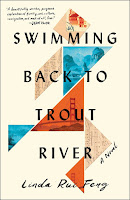My Rating: 4 stars
This book came onto my radar because I had read Emiko Jean’s previous contemporary / romance novel Mika in Real Life and loved it. If Jean’s name sounds familiar, that’s because she also wrote the popular YA series Tokyo Ever After. Now with The Return of Ellie Black, Jean takes on the mystery / suspense / thriller genre through the case of Elizabeth Black, a missing girl who reappears out of the blue after disappearing without a trace two years ago from a town in Washington. Ellie’s case is being handled by Detective Chelsey Calhoun, a small-town cop whose passion for solving missing person cases stems from her own sister’s disappearance 20 years ago. Chelsey sets about investigating what happened to Ellie, but the task proves to be more difficult than anticipated due to Ellie’s refusal to cooperate. When links to other missing girls start to surface -- some of whom, like Ellie, might still be alive – the urgency to solve the case reaches fever pitch. But with Ellie not cooperating, will Chelsey crack the case in time to prevent other girls from being taken as well?
This is a story that surprised me in many ways. First (and most important) is the fact that this is definitely NOT another one of those run-of-the-mill thrillers with a helpless (and usually stereotypically drawn) female protagonist at its center who is eventually saved by some guy in uniform (and maybe they live happily ever after if a romantic attraction is thrown in there somewhere). Instead, this story deals with many real-life issues that we continue to face in our society on a daily basis -- toxic relationships, discrimination of all types (i.e. race, gender, class), misogyny, racism, dysfunctional families, police corruption, class distinctions (i.e. rich versus poor), etc. – in a way that gave the story depth (which meant that, at times, I forgot that I was reading a thriller). The narrative alternates between the third person perspective (where we get to “hear from” various characters in the story, though mostly from Chelsey) interspersed with a first person “confession” of sorts from Ellie herself, where she recounts in detail everything that happened to her. For me, this type of narrative (alternating between different voices) can be a bit of a hit or miss, but in this instance, it was done in a way that made sense and also didn’t feel jarring. In terms of the plot, this one was particularly well done in the sense that I was truly kept at edge of my seat and most significantly, I actually didn’t see any of the twists and turns coming. I mention this because I’ve read my fair share of mysteries / thrillers over the years where I’m usually able to figure everything out by the halfway point, but that was definitely not the case here – I was genuinely surprised by how things turned out, not to mention all my guesses ended up being wrong (not a bad thing at all when it comes to thrillers).
Having said all that though, what I loved most about this book was the main protagonist (Detective Chelsey Calhoun). It’s not lost on me how rare it is to have the main character of a mainstream mystery (thriller/suspense) novel be a strong, smart, competent, kick-ass, no nonsense cop who is both female and Asian (full Japanese, not mixed race). And yes, it is Chelsey (as the lead detective on the case) who “saves the day” throughout the story, including at the end (I’m proud to admit that I cheered each time Chelsey triumphed, lol). Most importantly though, Chelsey came across as a real-life person – someone who has her own vulnerabilities and insecurities (especially in her personal relationships) while also having to deal with the realities that come with being female and Asian in a cut-throat profession where she has to fight like hell to prove herself every step of the way.
Emiko Jean is an author whom I’m glad to have discovered and whose backlist I’m happy to explore. I admire authors who are able to write across multiple genres and so far, based on what I’ve read of her work, Jean seems to have talent in this area. I hope to read more of her work soon.
Received ARC from Simon & Schuster via NetGalley.



